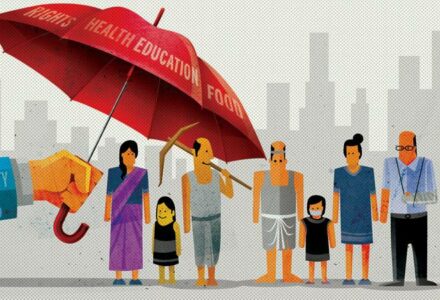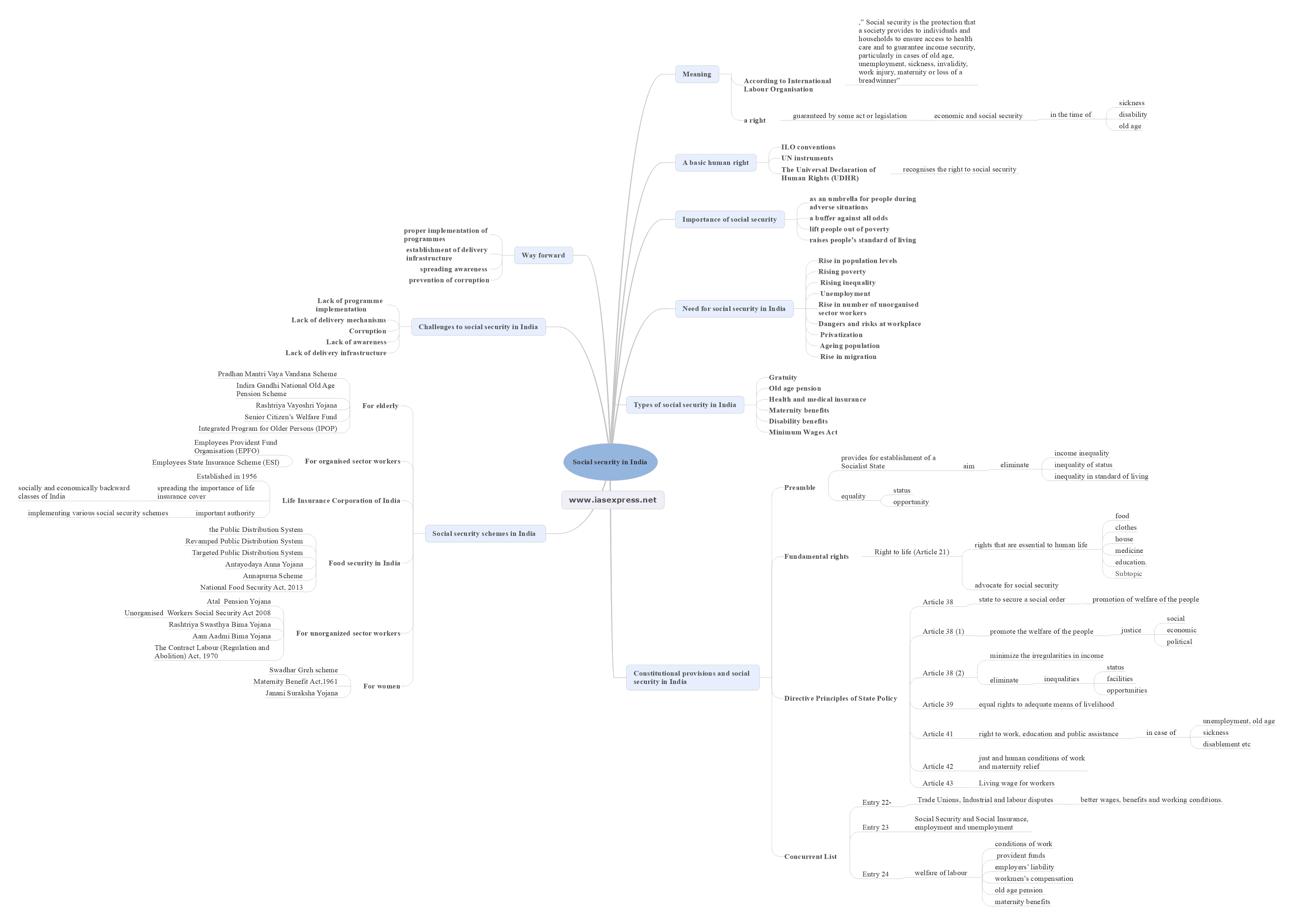Social Security in India: Need, Constitutional Provisions, Schemes

The recent occurrence of coronavirus pandemic has brought the issue of social security in India at the forefront. Large scale movement of migrant workers from the various cities of India was a great lesson for all the stakeholders. It made people realise the need for social security for all the members in the society and thus, there needs to be a great deal of discussion on this issue at all the levels.
This topic of “Social Security in India: Need, Constitutional Provisions, Schemes” is important from the perspective of the UPSC IAS Examination, which falls under General Studies Portion.
Social security-Meaning
According to International Labour Organisation,” Social security is the protection that a society provides to individuals and households to ensure access to health care and to guarantee income security, particularly in cases of old age, unemployment, sickness, invalidity, work injury, maternity or loss of a breadwinner”. It is a right which is generally guaranteed by some act or legislation to people for their economic and social security in the time of sickness, disability or old age.
A basic human right
In the ILO conventions and UN instruments, it is considered to be a basic human right. The Universal Declaration of Human Rights (UDHR) recognises the right to social security for all. It helps the recipients to ensure their rights to family protection and assistance, an adequate standard of living and adequate access to healthcare.
Importance of social security
Social security acts as an umbrella for people during adverse situations. Social welfare is not possible without social security. It acts as a buffer against all odds in the time of need. It helps in lifting millions of people out of poverty and thus, raises people’s standard of living.
Need for social security in India
- Rise in population levels
- Rising poverty
- Rising inequality
- Unemployment
- A rise in the number of unorganised sector workers.
- Dangers and risks at the workplace
- Privatization
- Ageing population
- Rise in migration
Constitutional provisions and social security in India
Preamble
The Preamble of the Indian Constitution provides for the establishment of a Socialist State which aims to eliminate income inequality, inequality of status and inequality in standard of living. The Indian constitution resolves to provide equality of status and opportunity to all the citizens of India.
Fundamental Rights
- Right to life (Article 21)-It includes all the rights that are essential to human life in a civilized society, such as food, clothes, house, medicine and education. Thus, advocates social security for Indians.
Directive Principles of State Policy
The various provisions enumerated in the Directive Principles of State Policy that try to ensure social security for Indians are:-
- Article 38-The state to secure a social order for the promotion of the welfare of the people.
- Article 38 (1)- The State to promote the welfare of the people by securing and protecting as efficiently as it may a social order in which justice “social, economic and political” shall inform all institutions of national life.
- Article 38 (2)- The state to minimize the irregularities in income, and to endeavour to eliminate inequalities in status, facilities and opportunities not only amongst individuals but also groups of people residing in different areas or engaged in different vocations.
- Article 39- It provides for equal rights to adequate means of livelihood to all citizens and distribution of wealth and material resources to subserve common good and prevention of concentration of wealth and means of production etc.,
- Article 41-Securing the right to work, education and public assistance in case of unemployment, old age, sickness and disablement and in other cases of undeserved want are significant measures of social security.
- Article 42- Providing just and human conditions of work and maternity relief.
- Article 43- Living wage for workers.
Concurrent List
- Entry 22-Trade Unions, Industrial and labour disputes which includes better wages, benefits and working conditions.
- Entry 23- It includes Social Security and Social Insurance, employment and unemployment.
- Entry 24-It includes the welfare of labour which further includes conditions of work, provident funds, employers’ liability, workmen’s compensation, old-age pension and maternity benefits.
Types of social security in India
- Gratuity
- Old-age pension
- Health and medical insurance
- Maternity benefits
- Disability benefits
- Minimum Wages Act
Social security schemes in India
For the elderly
- Pradhan Mantri Vaya Vandana Scheme– It is a social security scheme targeting those people who are above 60 years of age. It is implemented by Life Insurance Corporation of India. It was launched in 2017.
- Indira Gandhi National Old Age Pension Scheme– This scheme is for old age people aged 60, living below the poverty line. It is implemented as a part of the National Social Assistance Programme (NSAP).
- Rashtriya Vayoshri Yojana– The scheme provides physical aids and assisted-living devices to a senior citizen living below the poverty line. It is a centrally sponsored scheme.
- Senior Citizen’s Welfare Fund-Senior Citizens’ Welfare Fund (SCWF) was established under the Finance Act, 2015, to be utilized for such schemes for the promotion of the welfare of senior citizens, in line with the National Policy on Older Persons.
- Integrated Program for Older Persons (IPOP-The scheme provides for improving the lives of senior citizens. The scheme is implemented by the government since 1992. The scheme provides various facilities to old age people like food, shelter, medical care etc. The government does this through providing financial help to various NGOs and institutions which run shelter and old age homes for destitute old age people, etc.
For organised sector workers
- Employees Provident Fund Organisation (EPFO) – Launched in1952, it covers the salaried-class through the scheme of employees provident fund. It offers a sense of financial security to the employees for emergency use and after retirement.
- Employees State Insurance Scheme (ESI) –It is a social security scheme which helps the employees during a health emergency. The scheme provides a wide range of benefits like medical benefits, benefits related to disability, maternity, unemployment allowance etc.
For unorganized sector workers
- Atal Pension Yojana – Launched in 2015, the scheme targets unorganised workers like domestic helpers, drivers gardeners etc. It allows such workers to save for their old age. It is administered by the Pension Fund Regulatory and Development Authority (PFRDA).
- Unorganised Workers Social Security Act 2008- The Act was launched to provide social security benefits to workers of unorganised sectors and for their well being. The Act is implemented by the Ministry of Labour and Employment.
- Rashtriya Swasthya Bima Yojana– To meet the health urgencies of unorganised workers, this scheme was launched. It is for the workers living below the poverty line. It is a type of health insurance scheme for unorganized sector workers.
- Aam Aadmi Bima Yojana–This government-sponsored social security scheme has been to protect testing the interests of hundreds of individuals working in occupational groups within the unorganized sector. The scheme provides benefits to the insurer in case of natural or accidental death, in case of disability, etc.
- The Contract Labour (Regulation and Abolition) Act, 1970– The Act provide des for the introduction of better working conditions for labourers and to protect them from any kind of exploitation on at the workplace.
For women
- Swadhar Greh scheme– The scheme deals with providing basic facilities like food, clothing, shelter and medical facilities for those women who are in distress. The programme is implemented by the Ministry of Women and Child Development.
- Maternity Benefit Act,1961– The Act protects the employment of employed women during the time of their pregnancy and provides for entitlement of maternity benefit (full paid absence from work) during that period.
- Janani Suraksha Yojana-The Act aims the Act is to promote institutional delivery among the poor pregnant women. It consists of cash assistance with deposit-delivery delivery care.
Life Insurance Corporation of India
Established in 1956, it deals with spreading the importance of life insurance cover to socially and economically backward classes of India and meet the various life insurance needs of the community. It is an important authority implementing various social security schemes in India.
Food security in India
Food security in India had been a major concern in India throughout. To deal with it, the government has enacted various policies from time to time. This includes the Public Distribution System, Revamped Public Distribution System, Targeted Public Distribution System, Antayodaya Anna Yojana, Annapurna Scheme, National Food Security Act, 2013.
Challenges to social security in India
- Lack of programme implementation
- Lack of delivery mechanisms
- Corruption
- Lack of awareness
- Lack of delivery infrastructure.
Way forward
Although the government at various levels tries its best to ensure social security to its citizens, the situation is still grim in India. A variety of laws and regulations are in place to deal with social security in India but they reach a very small section of society. Therefore, there for a need of cooperation among various stakeholders to ensure proper implementation of programmes, the establishment of delivery infrastructure, spreading of awareness and prevention of corruption.
- http://www.legalserviceindia.com/legal/article-4011-the-unorganized-workers-social-security-act-2008.html
- https://economictimes.indiatimes.com/topic/Varishtha-Pension-Bima-Yojana
- https://www.financialexpress.com/money/interest-rate-on-senior-citizen-welfare-fund-reduced-check-details/1904536/
- https://pib.gov.in/Pressreleaseshare.aspx?PRID=1594906
- https://www.esic.nic.in/
- https://licindia.in/Products/Pension-Plans/Pradhan-Mantri-Vaya-Vandana-Yojana1
- https://vikaspedia.in/schemesall/schemes-for-senior-citizens
- https://nsap.nic.in/login/cbtMainPage.html
- https://financialservices.gov.in/insurance-divisions/Government-Sponsored-Socially-Oriented-Insurance-Schemes/Varishtha-Pension-Bima-Yojana



Articles from Santosh Kumar sir are like best …. but i must appreciate that Puja ma’am article is very much of same standards.
Its a request – Santosh sir should continue making articles – he can outsource Prelims & Editorials Mindmaps to others. if possible
thank you.